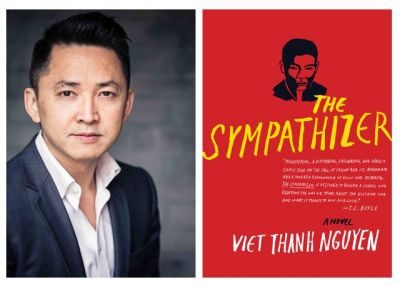Valerie Cabrera of the Writers’ Block Blog interviews Viet Thanh Nguyen on writing his book, The Sympathizer.

On this day exactly 40 years ago, the Fall of Saigon unfolded before the eyes of the world. Even today, the surrounding events continue to divide public and political opinion. Alongside this year’s anniversary, author Viet Thanh Nguyen’s debut novel, The Sympathizer, is receiving plenty of attention, including an op-ed and ravereview in The New York Times. In The Sympathizer, Nguyen confronts the history, politics, and even anger embroiled in the events of the Vietnam War in a dark, funny, and distinctly Vietnamese way.
His masterful handling of these topics, often associated with controversy and turmoil, transforms them into opportunities for justice, liberation, and confrontation in writing. In anticipation of his class “Politics, History, and Anger in Writing,” we asked Nguyen to tell us a bit about his writing journey.
Your class at the Loft deals with politics, history, anger. Is there ever a tendency to become overwhelmed by these often controversial and emotionally charged topics?
It’s through writing that I don’t become overwhelmed. Writing gives me a sense that I can take the pain of the past and, rather than suffering in silence, transform it into stories, where a certain kind of justice can happen. Storytelling is an act of justice, if done right, because simply by talking about what others don’t want to talk about or don’t even know about, the storyteller is forcing readers—or persuading them—to look, to listen, to learn.
Which works/writers (even movies as your NPR interview suggests!) have influenced your approach to these issues?
António Lobo Antunes’ The Land at the End of the World, about an old man recalling his youthful years as a medic in a brutal Portuguese colonial war in Angola, was my touchstone for writing my own novel.
Ralph Ellison’s Invisible Man was the classic that I was in some ways responding to.
Céline’s Journey to the End of the Night and Günter Grass’s The Tin Drum both offered a vast historical and satirical sweep that I aspired to.
Toni Morrison’s uncompromising oeuvre, with its commitment to the idea that black experience is universal experience, showed me the way.
My novel is also a spy novel and political thriller about an antihero, and plotting was key to it. I learned a great deal about plotting, suspense, and anti-heroism from watching, in the space of a year, all of The Sopranos, The Wire, and The Shield.
In writing The Sympathizer how did you confront these issues and was it difficult to do so?
The novel was a joy to write, actually. I did it in two years of days that were full of enthusiasm and sometimes ecstasy. I was lucky, because the previous ten years were spent on the drudgery of a short story collection. With the novel, I found the right form and voice for the story I wanted to tell.
It was not difficult because I wanted to tell the truth no matter how much it hurt or who it hurt, and finding that I could do that with this form was liberating. I decided from the beginning that this was not going to be a one-sided take on history, but an effort to see all sides, and to be sympathetic and critical of all sides.
The difficult parts came with writing about very traumatic events, which I had to imagine as fully as I could. There were some troubled nights where my stories infused my dreams.
What words of encouragement do you have for people that want to write and think about these things but often find their voices stifled?
Time is on your side. If you have an urgent story, and you want to tell it now, try. But if it doesn’t work out right away, don’t be defeated. Writing about politics, history, and anger means that you have chosen to undertake a kind of writing that is more difficult than most of the writing that finds its way into the world.
People don’t want to hear about anger for the most part, many in the literary world don’t think politics has a place in literature, [and] history is an enormous animal to wrestle with. Silence is easier for many people.
It might take decades to figure out how to deal with all these things and how to confront the silence. I spent my lifetime getting ready for the two years it took to write my novel. It was worth it.
And finally, since you are a professor at the University of Southern California, it seems teaching is an important part of your life. What do you wish for writers as students to take away from your class/book?
Be patient and persist. I was a lousy student of creative writing in college. I doubt that my famous teachers regarded me favorably. I wrote in fits and starts for a decade before I could discipline myself to write better. Then it took another decade to be good enough to write the novel. Persist, if you find that writing is a calling.
Viet Thanh Nguyen is teaching “Politics, History, and Anger in Writing” on May 18 at the Loft. He was born in Vietnam and raised in America. His stories have appeared in Best New American Voices, TriQuarterly, Narrative, and the Chicago Tribune, and he is the author of the academic book Race and Resistance. He teaches English and American Studies at the University of Southern California.


